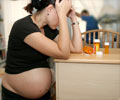The use of antidepressant drugs during pregnancy were not associated with neonatal problems at 2-4 weeks, finds a new study.

TOP INSIGHT
Antidepressant drugs during pregnancy were not associated with neonatal problems at 2-4 weeks.
Many women are concerned about taking antidepressants because they've heard the presence of these neonatal signs are more common in babies exposed to antidepressants.
"I believe that is true directly after birth, but this study shows those signs appear to be short-lived," said senior author Dr. Katherine Wisner, the Norman and Helen Asher Professor of Psychiatry and Behavioral Sciences and Obstetrics and Gynecology at Northwestern University Feinberg School of Medicine and a Northwestern Medicine psychiatrist.
"At two to four weeks postpartum, the signs women were reporting to us were more associated with preterm birth rather than whether their babies were exposed."
The additional two weeks also gave parents time to adjust to their newborns at home to better assess if their infants' behaviors were of concern to them. They could look for signs that couldn't be readily assessed during typical, 10- to 15-minute doctor examinations, such as length of sleep post-feeding, fever, projectile vomiting and stool characteristics.
"Most pregnant women are naturally going to worry more about their baby's health than their own and might forego taking an antidepressant to avoid these neonatal signs," said first author Amy Yang.
The researchers studied 214 mothers who were divided into three groups: Women with a mood disorder who were not taking any antidepressants; women with a mood disorder who were taking a serotonin reuptake inhibitor (SRI) antidepressant; women who did not have a mood disorder and were not taking an SRI antidepressant (comparison group).
They evaluated the babies for signs on the Finnegan Scale, which lists 21 symptoms that are most frequently observed in infants who have been exposed to illicit or prescription drugs. The rates of sign presence in the SRI, mood disorder and comparison groups were similar at 34.1 percent, 35.1 percent and 30.4 percent, respectively.
"We observed a significant relationship between Finnegan signs and preterm birth independent of SRI antidepressant exposure," said Yang, biostatistician for Northwestern's Asher Center for the Study and Treatment of Depressive Disorders. "Studies of NDS should consider the contribution of preterm birth to infant behavior."
Source-Eurekalert
 MEDINDIA
MEDINDIA




 Email
Email










